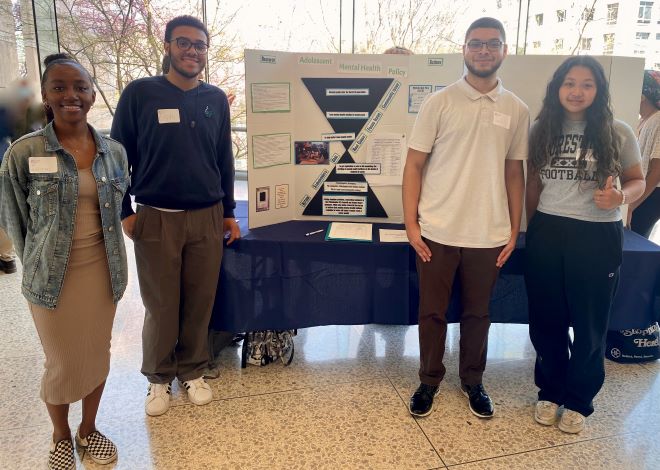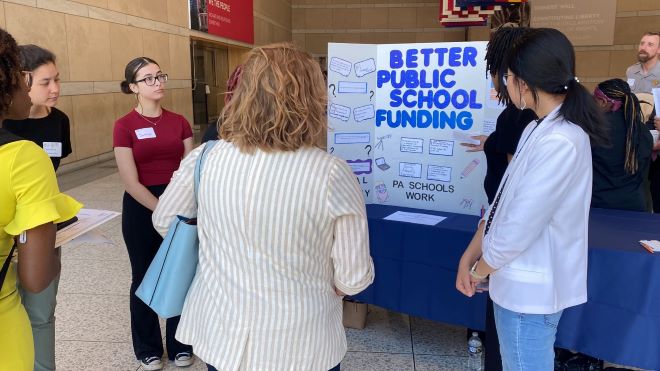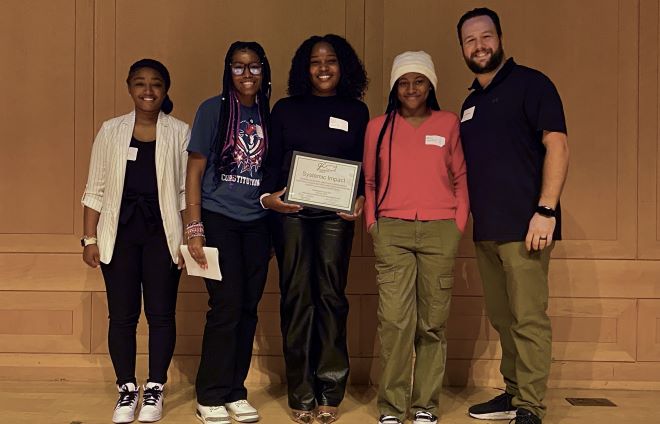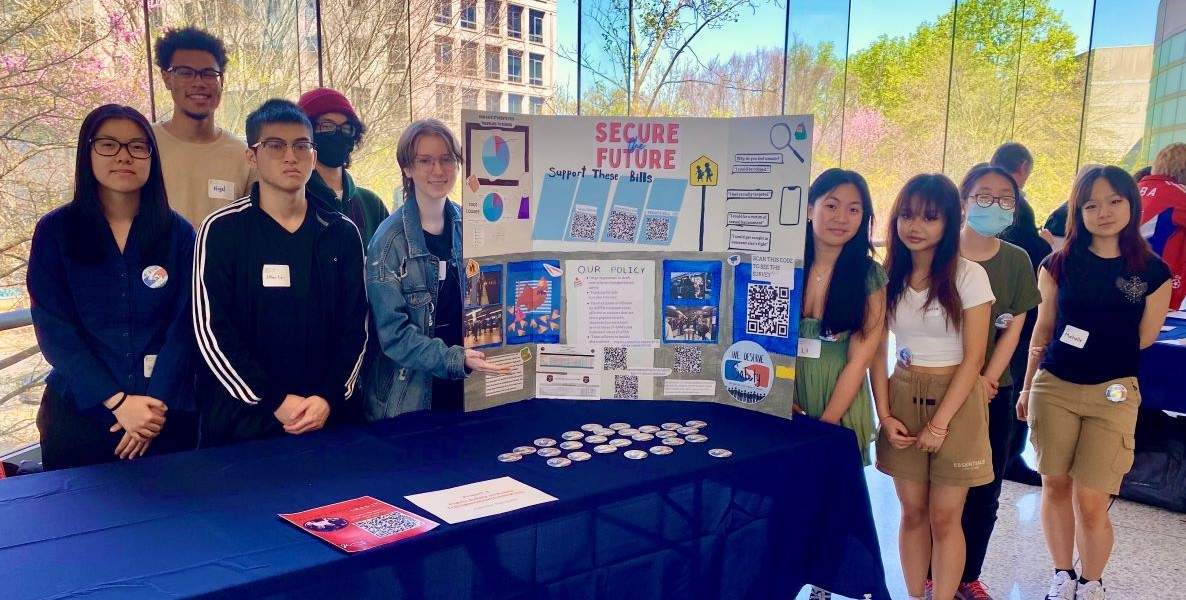Near the end of the first Civics Day competition in Philadelphia last week, a high school senior from Abraham Lincoln High School took the stage to sum up what would turn out to have been the theme of the day at the National Constitution Center.
“I believe,” said Jade Burton, winner of this year’s Student Changemaker Award, “that it is important for young people such as myself to have our voices heard. This award means that I am able to be a voice for students, that our voices are finally being heard, and that there is hope for a change.”
Jade was among some 50 students from high schools across the city who competed for various awards at the civics fair hosted by Generation Citizen, a national nonprofit that is piloting an action civics course in six Philadelphia high schools this year. The nine teams presented their projects on the second floor of the Constitution Center in old-school science fair style, with trifold paper displays, to a roving crowd of 48 community advisors who served as judges — elected officials, journalists, nonprofit, business and other civic leaders. (I had the privilege of being one of those advisors.)
“To the young people who think their voice doesn’t matter, I guarantee that your voice can make a change if you let it,” said Jade Burton.
The groups spent the last six months working together to pick an issue important to their community; surveying stakeholders, inside and outside of school; developing strategies to solve the problems they identified; and starting to advocate with policymakers. Their displays and their conversations with the judges showed the progress of their work. (Among the cringey tidbits: Several students said City officials they reached out to told them to stop calling because too many kids were reaching out. #really?)
The students from Constitution High School have a plan to counter the prevalence of sexual assault in their community. Central High School’s four teams (led by Citizen Integrity Icon and PA Youth Vote Co-Founder Tom Quinn) are gearing up to lobby for more school funding in Philadelphia; working to galvanize their community to push back against anti-trans bills in the legislature; advocating for improved safety on public transit; and lobbying to increase the legal age to purchase a gun in Pennsylvania.
Burton’s team from Lincoln wants to host a community fair to bring young people together with adults for activities, listening sessions and brainstorming on how to prevent and survive the trauma of gun violence near their Northeast Philly school. And the two teams from Girard Academic Music Program have plans to implement policies around adding suicide prevention hotline numbers to school badges, and increase the number of safe needle deposits in the city of Philadelphia.
The work proved what Arielle Jennings, GC’s chief partnerships and sites officer, said afterwards: “These are not just future leaders. Young people are leaders right now.”

Civics ed → Democracy
Civics Day marked the (almost end) of the first of the two-year GC pilot project in Philly to teach students about the mechanics, importance and power of engaging in the political and civic life of their city. This year, GC is working in 12 classrooms in six schools. (Vaux Big Picture High School and OIC Career and Academic Development Institute were unable to attend the fair.) Next year, they plan to double that number. In both years, the work is being funded by a research study from the National Opinion Research Center (NORC) at the University of Chicago and the University of Southern California, intended to measure how Generation Citizen impacts students’ civic knowledge.
After that, says Megan Brandon, GC’s regional program manager, the group hopes to expand throughout middle and high schools in the district with a combination of grant, private and district funding.
Like Philadelphia, most of GC’s work over the last 13 years has been in districts with predominantly underserved students, who have been shown to have less access to civic learning in and out of the classroom. The group currently works with 30,000 students in 150 schools in eight states.
Internal and external studies have found that among students who participate in GC programs, 93 percent “have the knowledge to create a plan to address a problem;” 92 percent “developed civic skills to engage in democracy;” and 81 percent “believe they can make a difference in their communities.” Taking part in GC also has been found to increase overall academic achievement, particularly in reading and social studies learning.

This matters — not just for the students, or their schools, but for democracy writ large. The last several decades in America have seen civics education pushed aside in favor of a greater emphasis on math, reading and science — not coincidentally the subjects in which standardized testing is used to gauge student, school and district progress. That has had devastating effects on our participatory democracy. Voting has plummeted; disaffection has soared, along with a profound disconnection between those in power and those most in need of change.
When young people are taught to participate civically in their communities they are more apt to vote and more open to being active citizens, from showing up to running for office. “The goal is for every young person to have a formative experience in making a difference in their community,” says Jennings. “We want them to have real world opportunities to have an influence at a young age, to build a pipeline of civic leadership.”
To that end, Generation Citizen is also working with a coalition of organizations to push for state-mandated civics education in all 50 states by 2026. A few years ago, the group helped write and promote one of the boldest action civics bills in Massachusetts to train teachers and to require all public schools to provide students with student-led civics projects. GC has also helped school districts in California create curricula to qualify students for the “State Seal of Civic Engagement.”
As, Arielle Jennings, GC’s chief partnerships and sites officer, said afterwards: “These are not just future leaders. Young people are leaders right now.”
Both of these go further than what we have in Pennsylvania, which in 2018 adopted Act 35, requiring every student to take a test of U.S. history, government and civics at least once during grades 7 to 12. The Act encourages teaching in three pillars — knowledge, skills and action — and offers toolkits to help teachers create curricula around those. The test, though, looks only at knowledge; it’s similar to the test given to immigrants before they become citizens, with multiple-choice questions about how our government works, and an essay based on events in U.S. history.
That is not the same thing as actually doing democracy, like the students at Civics Fair, or a few other programs in Philadelphia, including The Rendell Center for Civics and Civic Engagement, and Need in Deed.
A call to (civic) arms
GC sends tool kits — including the trifold display boards — to classes in their program, along with a set of steps that highlight different aspects of engagement:
-
- Community Issues: Talking about concerns to members of their school community.
- Focus Issue: Narrowing the focus through a consensus-building process in the classroom.
- Root Cause: Conducting a deep dive into why the problem is happening.
- Goal: Setting a goal that represents lasting change related to the problem.
- Targets: Identifying a “decision-maker” with the power to enact the change, as well as “influencers” who can push that decision-maker.
- Tactics: Making a plan to reach those targets, through meetings, emails, phone calls, etc.
GC’s Brandon was a teacher in Texas when she first started working with Generation Citizen, and witnessed how heading into Civics Day the students learned to play to their own strengths. “There were some who were so vocal who did not mind speaking and making calls,” she says. “Some were more subdued and passive, but were really artistic, and could design the trifolds beautifully. Some were great writers, and wrote the speeches their classmates gave.” In other words: A microcosm of how activism happens in real life.

At the end of last week’s Civics Day, teams were awarded prizes in several categories: Grassroots Change; Systemic Impact; Collaboration and Diversity; Action; and Open-Mindedness. (This first year all teams won something, but that will change as more teams participate.) Then Jade’s teacher, LaTae Johnson, introduced her Changemaker student, who gave the closing speech.
“To other young people here today, I would like to say: Don’t give up, even if the outcomes aren’t in your favor,” Jade said. “Be assertive and everything will fall in your hands. To the young people who think their voice doesn’t matter, I guarantee that your voice can make a change if you let it.”
Amen, sister.
![]() RELATED
RELATED



